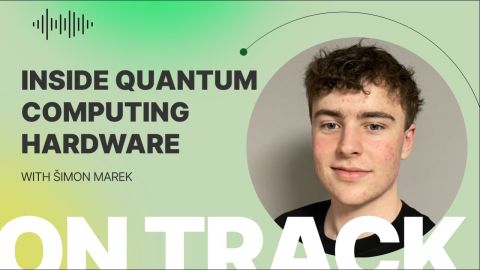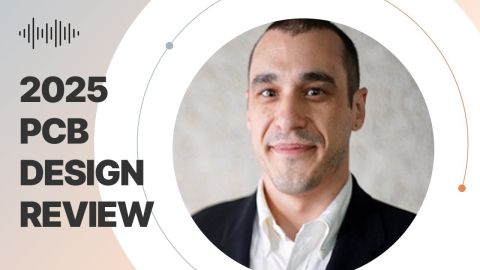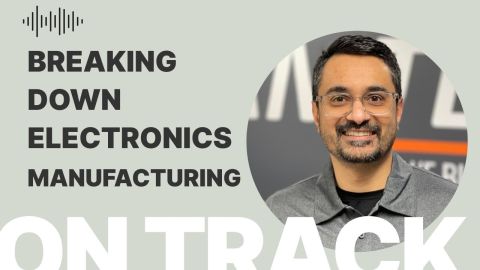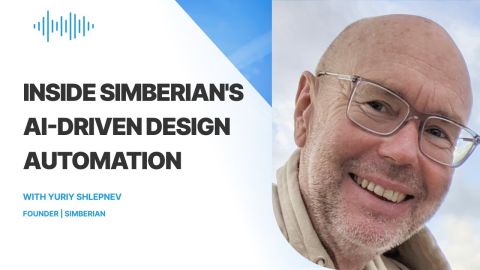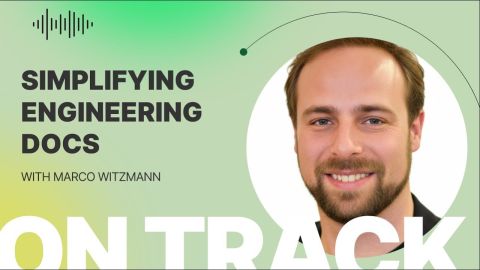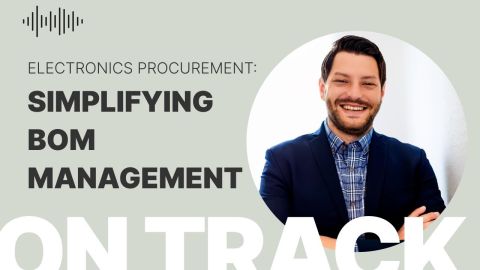The Critical Shift: Bridging the Generational Gap in PCB Design

In this episode of the OnTrack Podcast, host Zach Peterson speaks with Cory Blaylock, Director of Workforce Partnerships at IPC, in a profound discussion on the looming generational gap within the PCB design and electronics manufacturing spaces, as well as what those industries might be able to do about it. As one generation of seasoned experts nears the end of their careers, the urgency to cultivate a new wave of talent becomes ever more critical. This episode delves deep into the challenges and opportunities that lie ahead in bridging this divide.
Listen to the Episode:
Watch the Episode:
Key Highlights:
- The Generational Shift: Explore the evolving landscape of PCB design and how the departure of experienced professionals is creating an urgent need for fresh talent.
- IPC's Role: Discover how IPC is spearheading initiatives to develop the workforce of tomorrow through innovative apprenticeship programs approved by the US Department of Labor.
- The Journey from Classroom to Industry: Cory shares his unique transition from education to a pivotal role in workforce development, shedding light on the path that lies ahead for aspiring PCB designers and manufacturers. - Future-Proofing the Industry: Learn about the measures being taken to ensure the sustainability and growth of the electronics manufacturing sector amidst these changes.
Further Resources:
- Follow Cory Blalock on LinkedIn
- IPC Apprenticeship Information:
- IPC Information for employers
- IPC News releases
- Check out this article about working with IPC compliant Footprint Models
Transcript:
Zach: How bad is the generational issue in manufacturing versus PCB design?
Cory: I would definitely say that across the gamut of electronics manufacturing, whether that be PCB design or production manufacturing and electronics manufacturing, PCB fab. So I think that shift that happened about 20 ish years ago when manufacturing was moved out of the US, there has been a change, because now, all of the people that had that experience are getting close to retirement age, and they're exiting the workforce. So all of that knowledge and experience is leaving with them.
Zach: Hello, everyone, and welcome to the Altium OnTrack Podcast. I'm your host, Zach Peterson. Today, we're talking with Cory Blaylock, Director of Workforce Partnerships at IPC. If you've been paying attention to industry news lately, you have probably heard about some new apprenticeships that were approved by the US Department of Labor, and we're very happy to have Cory around to talk about these new apprenticeship programs. Cory, thanks so much for joining us today.
Cory: Thank you so much for having me.
Zach: Now, we haven't had you on the show in the past, so if you could, just tell us a bit about your background and what it is you do at IPC.
Cory: Sure, so I am the Director of Workforce Partnerships for IPC. I am physically located in Texas, and my background is actually education. I spent 12 years as a classroom teacher before I made a career shift, and I started working with Lockheed Martin Missiles and Fire Control in Lufkin, Texas, where I worked for about eight years before I joined IPC last April.
Zach: That's interesting. How did you make the shift from teaching in classroom to Lockheed Martin?
Cory: It was actually, I don't wanna say by accident, because I think it was all part of the plan, but I worked in education, specifically STEM education. I got my master's degree in science education from Montana State University, and I loved teaching science. So when there was an opportunity for me to join Lockheed Martin, I was very drawn to what they do, the STEM influence that they have, and working with engineers and manufacturing, which I actually had no idea what was involved in all of that when I first started at Lockheed. So it was sort of like drinking from the fire hose. But it was a great experience and I learned a lot, and transitioned to helping support Lockheed's workforce and moving toward helping manufacturers across the industry and value stream of the supply chain to work on workforce development with IPC.
Zach: So how active is a company like Lockheed in influencing, let's say, either primary, or secondary, or university level education as part of workforce development?
Cory: Well, I think Lockheed has their own STEM and vocational scholarship, so it's something that I know is a high priority for them. But in my role with IPC, we are actually focusing on engagement with high schools, CTE, Career and Technical Education programs, as well as community colleges, and working with four-year universities to impact and shape what they're teaching in those STEM fields, specifically engineering and manufacturing related, so that they can actually train the workforce of the future.
Zach: So on that note, some of the recent news in iConnect was that IPC received approval for an apprenticeship program, and actually, I think just yesterday, there was some additional news on that point approval by the Department of Labor. So if you could tell us a bit about some of these apprenticeship programs that IPC has been involved in.
Cory: Sure, so apprenticeship, and I'll just give a quick background on what apprenticeship is. It is an earned while you learn model. So traditionally, when we think of apprenticeships, we're thinking of trades like plumbers and HVAC technicians and things like that where they're working with a more experienced person on the job and getting that on the job training. So that's the typical apprenticeship model that most people think of. And electronics manufacturing can definitely fall within that model of training. There's three components. You have an apprentice learning a skill, a journey worker, or a mentor who is already proficient in a skill training that apprentice. And then you have related technical instruction, so that the apprentice is getting theoretical background and technical information to be able to apply in a production type setting. So the mentor teaches the apprentice all the skills they need to know to be fully competent and proficient by the time their apprenticeship is over. In addition to those competencies, there's also a behavioral competency, a portion that the Department of Labor requires, which is considered the soft skills that everybody is always talking about when we have workforce conversations. Are you able to show up on time to work? Are you considered trustworthy? In the electronics industry, that is very important, because there's a lot of compliance and regulations around recording date, and batch codes, and serial numbers appropriate to traceability requirements for parts and components that could end up being recalled later if there was ever a failure or anything like that. So do apprentices have attention to detail? Things like that, that are often established in a company's culture are also an important component and part of registered apprenticeship programs.
Zach: So this is interesting, mostly because I think IPC and Altium and some other groups have been pursuing workforce development efforts for quite some time. I think a lot of it has been focused more at the professional level, maybe, you know, new graduate kind of level, but nothing really with apprenticeship programs. There's also been some focus at the high school level. So why did IPC feel there was a need to go the apprenticeship route?
Cory: So the Department of Labor offers opportunities for employers, trade associations, industry intermediaries to submit national program standards, which was what drew IPC to apprenticeship model is because we have over 3,200 member companies across the globe with a large amount of those being in the US. So this is a US based apprenticeship model that was approved by the Department of Labor in conjunction with their national program standards. So there's compliance issues with the formatting and things like that that DOL requires. So we were drawn to that, because we wanted to make it easy to remove the red tape that's, you know, typically associated with an individual company or employer creating something like this. And the amount of paperwork and time it takes, if IPC can take on that burden and do the hard work and get everything approved, so that it's literally like an easy button an employer can press to implement an apprenticeship program and train their workforce both to address their immediate needs of needing to maybe upskill or reskill incumbent workers to be able to meet the needs of their changing production needs or contracts, things like that, programs that they're producing, to hiring new employees, because they're growing so quickly, and with the onshoring and reshoring efforts that are happening in the US, making sure that they are best suited to be able to meet those needs and demands for a well-trained workforce. Unfortunately, in the US, there has been a decline in focus on manufacturing over the last 20 years, so bringing awareness to employers and potential employees and apprentices is also another really great way that apprenticeships help to bridge that gap between education and industry. Working with teachers, like you mentioned in high schools and community colleges, so that they can help guide people to opportunities that maybe they hadn't considered, because those opportunities were not presented to them when they were in school earlier, because the focus in the US like I mentioned, changed over the last 20 years. And so now that focus is, the pendulum is swinging and the focus is changing back.
Cory: So you brought up employers just a moment ago, and so I think one important question is, is this a program that is demanded by employers?
Cory: Yes, so we have had, I wanna say 75% of IPC members have mentioned that workforce issues and finding and training and retaining employees in their industries have been a driving factor in their ability to scale. So yes, I do believe that it has been employer demanded.
Zach: So what were employers doing with workforce development within their own companies before this kind of program? Was it all just, you know, people have to show up, and you expect them to be trained? Were they having to do their own kind of training programs?
Cory: Typically, yes, they're homegrown for companies that have one production site or production site that cross the entire US or globe. They may not be standardized. Sometimes, if we're lucky, yes, they are standardized, and it's the same everywhere, but human nature and the human element of things does not allow everything to be standardized in every single aspect. Apprenticeship does allow for some of that standardization and for manufacturing companies that are focused on lean manufacturing as an important component of being able to produce and scale quickly. Training and workforce development should be handled in a standardized way, as well, to help with that. That way, employers are not having to reinvent the wheel at every stage. Plus, the workforce dynamic is changing very drastically with different generations of people entering the workforce, and then leaving the workforce. So needing to address these changes and what people want out of employment, and careers, and pathways, and opportunities is really important for employers to address. And apprenticeship offers something for both the employee or apprentice and the employer as far as data from the Department of Labor. 91% of apprentices retain employment with the employer that they're trained with. And on the apprentice side, they see a higher wage opportunity over the course of their career by coming in as an apprentice, and learning that role and that job, and then having additional opportunities as a result of being well-trained for an employer.
Zach: So this is really interesting, because you mentioned some dynamics here that I think are really important. One of those is generational, which has been highlighted by some other folks we've had on the podcast. We've had John Watson who is an Altium employee but also works at Palomar College, and he has repeatedly highlighted the generational issue, and he's working more on the design side teaching new designers. How bad is the generational issue in manufacturing versus PCB design? Because PCEA has highlighted and I believe IPC is also highlighted a generational issue with PCB designers, but I don't work in manufacturing, so I'm not aware of whether or not that same generational gap exists in manufacturing, and it sounds like it does.
Cory: Yes, I would definitely say that across the gamut of electronics manufacturing, whether that be PCB design or production manufacturing and electronics manufacturing, PCB fab. So I think that shift that happened about 20 ish years ago when manufacturing was moved out of the US that there has been a change, because now, all of the people that had that experience are getting close to retirement age, and they're exiting the workforce. So all of that knowledge and experience is leaving with them. So there is a rush to bring people who are interested, who have the skillset, who can be trained, and can learn some of these knowledge and skill bases as far as the manufacturing and PCB design, PCB fab, all of those sort of unique niche things that are not taught in schools. Production manufacturing is not something that is taught in elementary school, or middle school, or high school even as really an occupation that people say, "I wanna do this when I grow up." People say, I want to be, you know, a nurse, or a doctor, or a teacher, because that's what they see and that's what's presented to them. People don't raise their hand and say, "I wanna be a manufacturing apprentice," or, "I want to learn how to manufacture electronics," or, "I wanna know what it takes to make X, Y, and Z in a manufacturing facility." So there's not a lot of kids raising their hand thing, I wanna be a PCB designer. They don't even understand how ingrained electronics are in their daily lives. So having that awareness out there is so important to address those generational issues of the workforce that's retiring and leaving the electronics manufacturing industry, and how we need to attract and retain the talent that will be the future of electronic manufacturing.
Zach: Yeah, you brought up something really important, which is something I directly experienced, and, you know, really recognized, I'm gonna date myself here, but 20 years ago, when I was in high school, which is that manufacturing was not seen as something you really aspire to. And I think that's really unfortunate, especially when you look at an area like electronics manufacturing. It is complex, it does require a lot of knowledge and skill, and, of course, it pays the bills, too. So there's really nothing wrong with it. But, you know, when I was younger, you know, my parents, my grandparents constantly told me that you don't wanna work in that kind of environment. It was something that was really looked down on, and I think now we're really paying the price for it.
Cory: Right, the perception is is that if you work in manufacturing, it's a dirty job, and there was a whole TV show about dirty jobs, and how people don't wanna do those, right? It's not the the occupations that people flock to, or that kids talk about when I wanna grow up and be a teacher, I wanna be a nurse, I wanna be a doctor, I wanna be an astronaut even. But they don't say I want to be in manufacturing. And what they don't realize is for electronics manufacturing, it's not dirty, it's very clean actually. It's very high tech, it's very STEM focused, and people have to have that attention to detail to be successful in that environment. And so I think that there's a lot of skills that transcend multiple occupations, but we can focus on what manufacturing actually is, what electronics manufacturing is, and how it impacts their daily lives, and sort of change the framework of what people think about as far as occupation. And apprenticeship gives a great opportunity for that, because it is an earn while you learn model, so people can actually earn a paycheck, earn a living, and like you said, pay the bills, while they're learning a new skill, and can contribute in a meaningful way. That there may be opportunity for college credit to be articulated for apprenticeship programs. There may be opportunity for growth and tuition reimbursement for people to continue their education. So apprenticeship is a great on-ramp, I think for manufacturing careers in the electronics industry.
Zach: Well, and I think some of those skills that folks will learn in these types of programs will very easily transfer over to other careers that might not be in manufacturing. So even if they don't end up in a manufacturing job for the next few decades of their lives, they're still gonna learn something that makes them much more valuable than someone who just went to college to get the piece of paper, and say, "Hey, I have a degree."
Cory: Correct, because they have the hands-on experience that the person who may only be attending college doesn't get while they're in college. They have to wait until after they graduate to get that hands-on experience, while an apprentice is doing both simultaneously.
Zach: Yeah, I'm seeing among young people that there's a bit of a shift in how they think about education and there's more of a recognition that, "Hey, just going and getting the piece of paper is really not cutting it." Especially when I think people start looking at student debt and you look on social media, and people are talking about how their debt load is a bit burdensome, and they maybe don't feel like they got everything they could out of their education. This really starts to sound like a viable alternative. But I think the challenge is getting the message out there, and getting young people excited about this, while also communicating some of those other points that you brought up about it is high knowledge, it is high skill, it is solving complex problems.
Cory: 100%, and with what we did, what IPC did with the Department of Labor, getting the national program standards allows our apprenticeship to be registered and recognized by each state. Since we have employers in all 50 states, we wanted, like I mentioned, a plug and play type apprenticeship. So employers, whether they're smaller mom-and-pop type shops or medium sized employers, all the way up to large EMS or OEM companies could utilize a registered apprenticeship model, and they can help standardize that training and offer those opportunities. And there are benefits for employers to utilize an apprenticeship program to attract and retain their workforce. There is a lot of funding opportunities that are available for employers to help offset training costs, because it is a recognized model that has already been vetted by the Department of Labor. And so local and state workforce dollars can, sometimes, help offset, there's federal funding opportunities that can help employers offset these training programs. So getting the employers aware is also another aspect of changing what the workforce looks like now, and how we've always done it to how we could do it.
Zach: Yeah, I think the employers are much more tuned into these issues, 'cause they're facing them every day, and so I would be less concerned as someone who's, you know, observer of all of this that the employers are gonna see the value of it. I think the thing I worry about and that, you know, kind of keeps me up at night a little bit is whether or not kids are gonna see the value in this, and whether or not they are going to want to participate. So one question I have for you is, are you seeing any kind of recognition of the importance of the apprenticeship programs or the apprenticeship route by young people? You know, I brought up those points that I mentioned just a moment ago about people talking about, you know, this kind of issue on social media, but at some point that has to translate into action by the next generation of students.
Cory: So IPC is trying to influence some of that. We actually had a pilot program for career and technical education students in three states across the US this year. We're still in the midst of wrapping those experiences up, but we had over 200 high school students who are actually completing the related technical instruction pieces that IPC offers as workforce training for our registered apprenticeship program for electronics assembly, while they were in high school, which would allow them to complete sort of a pre-apprenticeship type model that would allow them to move into a registered apprenticeship program. It also allowed for a lot of career awareness. Some kids who didn't know anything about manufacturing really enjoyed the hands-on soldering pieces, and have provided feedback that it was fun, and they liked it, and they want to learn more about it. There are students who are going to be pursuing engineering degrees who may not have actually held a soldering iron until they took an electrical engineering course, maybe their junior or senior year. So this was a way to ignite some interest into fields that maybe had not been considered previously, and are allowing students to consider apprenticeship as an opportunity to move into something. Maybe they don't have aspirations to go to college, but they need to figure out what they wanna do when they graduate. And this is another tool in their toolbox to allow them to have that consideration to make those changes like you mentioned.
Zach: And we're talking about students who, you know, maybe at the high school level, I think one of the wild cards here is the parents. Do you have any data as far as what the parental push is for students to engage in this type of program?
Cory: So the parents are a very important factor to consider. We are working on figuring out how to work with parents effectively to incorporate pre-apprenticeship and youth apprenticeship opportunities. There's not any hard numbers that I have in front of me right now that I can reference, but the parent piece is definitely something that needs to be thought of when establishing like your entire workforce ecosystem. Employers need to think about how they can address the immediate need, how they can address their long-term needs, and working and partnering with schools in their district, in their region, so that they can attract those students instead of... My goal would be to have career signing days. So instead of students just having signing days, celebrate sports achievements, and what team they're gonna play for, I wish that we could have employer signing days, where we can match employers with high school students, and celebrate I have a job set up ready for me, and I'm gonna join this apprenticeship program when I graduate high school. I think that involving the parents in that way to help them make those decisions would be so important and something to be celebrated.
Zach: That's a really interesting idea. Now, you mentioned a program, a pilot program I should say, with I believe 200 students. How do we scale that and add a couple of zeros to that number?
Cory: That is something that we are having conversations about doing now. Like I mentioned, the funding opportunities that are available in various state entities, federal entities, governmental agencies. There is opportunity to have awareness programs and things like that. So we are pursuing those opportunities to help scale and add the couple of zeros that you mentioned, so that we can provide hands-on meaningful experiences to both students and teachers. I'll give you a personal anecdote about my experience from being a teacher. I was in school for 12 years as a student myself. I was in college to become a teacher, and then I went back to the schoolhouse to teach. I had no industry experience before while I was teaching, and it was my best intention to prepare students for the real world. Although, I had no actual real world experience myself. So I think that having opportunities to train the CTE teachers and the teachers in the K-12 space, as well as, the university and community colleges who may also not have real world industry experience to take them and be able to offer externship opportunities, where they can go to an employer or an industry and job shadow, and see what is it really like? What are employers needing us to help them get as far as the product, which is the students, the future apprentices. What can we do to help ensure that our supply chain and the education is what they need in industry. So I think making sure that we have those meaningful hands-on opportunities to train the teachers at whatever level they are at, give them the experiences, so they can go out and see what is it really like they may have the misconceptions that manufacturing is a dirty job, and is not something that people should want to go into. And so they may inadvertently be perpetuating that idea when that's not the case. You and I both know that, but I really think that us being able to focus on teacher training, as well as student involvement, engagement, and awareness is equally as important.
Zach: And as far as outreach to the student end of it goes, or I guess scaling the student demand, it just seems like there are so many factors that demand outreach and input from industry directly to multiple parties, right? I mean, there's the students, there's the parents, there's just so many different people that have to be reached
Cory: 100%. So IPC cannot do it all. We are partnering with local and regional workforce boards to help spread the word. We are being registered on various states eligible training provider lists, which allow those workforce boards and local entities to be able to tap into funding to help support efforts like that. We're working with other intermediaries to figure out how we can scale effectively youth apprenticeship opportunities and pre-apprenticeship opportunities. So we are working diligently to try and get those messages out, so that we can help support the industry in this need that they have shared with us.
Zach: We have a few more minutes, but if you could just give us an overview of what the career trajectory is for students who participate in this program.
Cory: So one of the great things about apprenticeships is that they can be stackable. So for example, we have an electronics assembler occupation. So those apprentices come in, get 175 hours of related technical instruction, and then they're brought to full competency typically within a year's time with all of the on the job training components, parts, and pieces in addition to the related technical instruction. We also have a PCB fabricator occupation, and we are working on additional occupations like a wire harness assembler. So for example, the stacking model, if we have an electronics assembler and a wire harness assembler, and we have somebody who goes through both of those programs, now they are a very powerful employee, and are very valuable to a company, because they're well trained across multiple programs and production lines. And those are the type of people that once they really know the product, the next step for them would be like a frontline leader, being a shop supervisor or something like that, because they actually know the day-to-day job of what the assemblers and operators are doing and they're able to move the product, and understand what it takes to do that job. And so you have career opportunities that can be presented by stacking apprenticeships, or maybe even people are inspired by getting this knowledge and they really like doing the work. And so they go on to get an engineering technology degree, or maybe they get an electrical or mechanical engineering degree at a university. And now, you have an engineer who started as an apprentice, started working their way up, and they make the best engineers, because they, again, understand what it takes to support an operator or an assembler. And write work instructions that are effective and do all the things that they need to do in that role. So having these experiences and opportunities that begin with apprenticeships, I think only help an employer's bottom line.
Zach: Well, this is all very encouraging, and I'm really happy to hear about this, and I think as all of this starts to unfold and develop, we'd love to have you come back on, and give us a status update as far as the scaling of the program, increase in demand by students and employers, and things like that.
Cory: Sure, that sounds great, I'd love to.
Zach: Very good. Thank you so much for being with us today, Cory.
Cory: Thank you.
Zach: For everyone that's out there listening, we've been talking with Cory Blaylock, Director of Workforce Partnerships at IPC. If you're watching on YouTube, make sure to hit the like button, hit the subscribe button. You'll be able to keep up with all of our tutorials and podcast episodes as they're released. And, of course, make sure to check out the show notes for more information about these partnerships with IPC. And last but not least, don't stop learning, stay on track, and we'll see you next time. Thanks, everybody.

